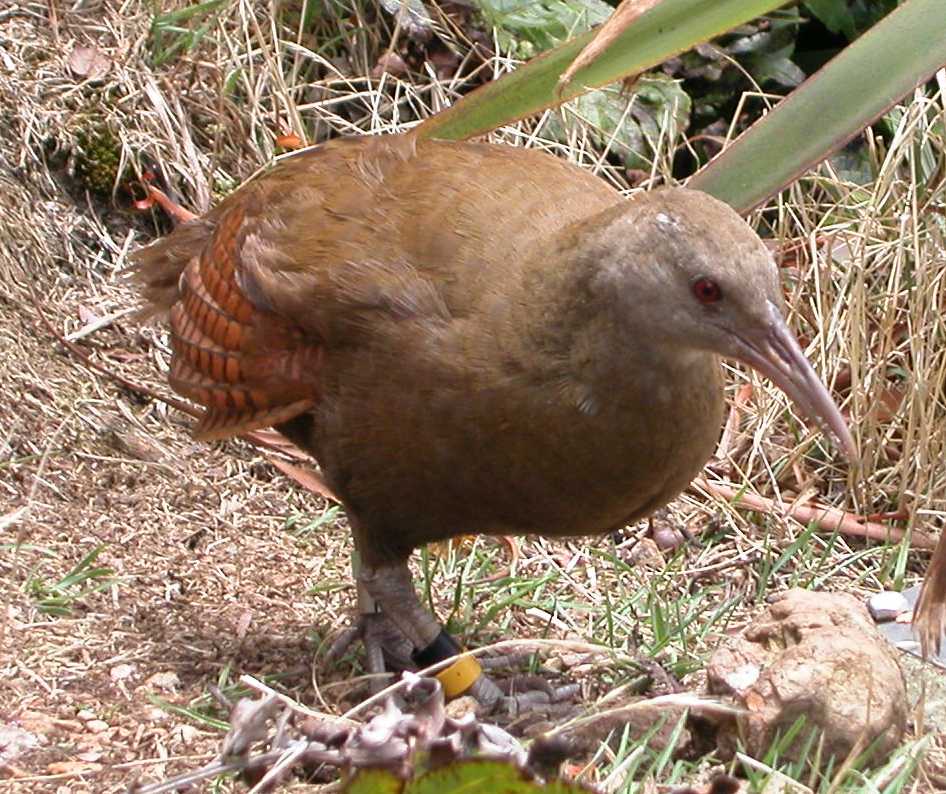- Lord Howe Woodhen
Taxobox
name = Lord Howe Woodhen
status = EN
status_system = IUCN3.1
trend = stable

image_width = 250px
regnum =Animal ia
phylum = Chordata
classis =Aves
ordo =Gruiformes
familia =Rallidae
genus = "Gallirallus "
species = "G. sylvestris"
binomial = "Gallirallus sylvestris"
binomial_authority = Sclater, 1869The Lord Howe Woodhen, "Gallirallus sylvestris", also known as the Lord Howe Island Woodhen or Lord Howe (Island) Rail, is a flightless
bird of the rail family (Rallidae). It is endemic toLord Howe Island off the Australian coast. It is a small olive brown bird, with a short tail and a downcurved bill. The Lord Howe Island Rail lives insub-tropical forest s, feeding onearthworm s,crustacean s,fruit , and taking the eggs ofshearwater s andpetrel s.Woodhens mate for life and are usually encountered in pairs. They are territorial and will appear from the forest's understorey to investigate the source of any unusual noise. A mated pair will defend an area of approximately 3
hectare s, with offspring being expelled from this area once grown. The population of birds is thus restricted by the amount of available territory. [http://www.nationalparks.nsw.gov.au/npws.nsf/Content/The+Lord+Howe+Island+woodhen]Gilbert Rail
A rail, know only from a single specimen in the form of an alcohol-preserved skin at
Harvard , was originally believed to have been collected on one of theGilbert Islands and named as the Gilbert Rail, "Gallirallus conditicius" (Peters & Griscom, 1928).However, the island attributed to this holotype is low, rocky and sandy, and has no habitat suitable for a rail.
It now appears that a curatorial error led to the specimen being labelled to the wrong collection, and the specimen is actually an immature female Lord Howe Woodhen. It differs from that species only in a paler crown, throat and underparts, and browner head, but long immersion in alcohol could have changed the colour. (Taylor and van Perlo,"Rails" SBN 90-74345-20-4)
The island to which the specimen was originally attributed is 4,500 km from Lord Howe Island, and it appears improbable that two flightless rails could evolve separately with no morphological differences.
Decline and recovery
When explorers first discovered Lord Howe Island in 1788, they identified 15 bird species including the then common woodhen. Being flightless, curious, and having never been hunted, they became a readily available source of food for visiting sailors and the island's early human population. Since its discovery and the arrival of settlers on the island in 1834), nine of these 15 species became extinct. The woodhen declined in numbers until in the late 1970s, when surveys showed that the population had dropped to less than 30 birds, confined to the difficult to access summit regions of the island's two mountains, Mount Gower and Mount Lidgbird. [http://www.nationalparks.nsw.gov.au/npws.nsf/Content/The+Lord+Howe+Island+woodhen]
A comprehensive study was done to determine the cause of the decline, which was eventually tied in to the introduction of feral
pig s. The elimination of the pigs and other disruptive animals (goats), plus a programme ofex-situ conservation (captive breeding) which commenced in May 1980 (the first egg was laid in June 1980), allowed the Lord Howe Rail to recover its numbers. Today there are now about 250 birds, [http://www.nationalparks.nsw.gov.au/npws.nsf/Content/The+Lord+Howe+Island+woodhen] which may be the optimal population size for the island. [http://www.fnpw.com.au/OurProjects/Plants_Wildlife/LHIWoodhen.htm]The analysis of the threats to the Lord Howe Rail, and the solution, is considered a model for
conservation biology . A number of possible causes of the decline were on the island, from introducedrat s toTasmanian Masked Owl s. However, only the elimination of the pigs would have saved the species fromextinction , and identifying the cause and solution in a timely manner was crucial to the success of the programme.Following the success story of the woodhen, there have been recovery efforts for other endemic species on Lord Howe Island, including the Lord Howe Island land snail ("Placostylus bivaricosus") and the Lord Howe Island Currawong ("Strepera graculina crissalis").
References
* Database entry includes a brief justification of why this species is endangered and the criteria used
* [http://www.fnpw.org.au/OurProjects/Plants_Wildlife/LHIWoodhen.htm The recovery of the Lord Howe Island Woodhen (Foundation for National Parks & Wildlife)]External links
* [http://www.birdlife.org/datazone/species/index.html?action=SpcHTMDetails.asp&sid=2850&m=0 BirdLife Species Factsheet.]
* [http://www.nationalparks.nsw.gov.au/npws.nsf/Content/The+Lord+Howe+Island+woodhen About the Lord Howe Island Woodhen] (National Parks & Wildlife Service NSW website)
* [http://www.austmus.gov.au/birds/gallery/eggs/046.htm Image of an egg of a Lord Howe Island Woodhen] (Australian Museum website)
Wikimedia Foundation. 2010.
